Mitsui Fudosan Creating Neighborhoods in Nihonbashi
New Stage of Nihonbashi Revitalization Plan Initiated
Announcement of Vision and Three Priority Initiatives, Including Waterside Regeneration
August 29,2019
Mitsui Fudosan Co., Ltd.
Mitsui Fudosan Co., Ltd., a leading global real estate company headquartered in Tokyo, announced today that it has defined a vision for neighborhood renaissance under its Nihonbashi Revitalization Plan along with priority initiatives and a neighborhood renaissance philosophy for the plan’s 3rd Stage.
Mitsui Fudosan is currently promoting the Nihonbashi Revitalization Plan, a joint public-private-community initiative on the concept of “Preserving and Revitalizing the Heritage while Creating the Future” that began in 2004 with the opening of COREDO Nihonbashi. The project has promoted the diversification of urban functions and greater urban vitality through mixed-used redevelopment.
In the 2nd Stage of the Nihonbashi Revitalization Plan, which began in 2014, Mitsui Fudosan promoted neighborhood renaissance in a way that combines its tangible and intangible aspects in four key areas: creating business clusters, neighborhood renaissance, in harmony with the community and reviving the aquapolis. As a result, the district has diversified its uses and further diversified and internationalized its companies and population, and its former vitality is beginning to return.
Now, in 2019, with completion of Nihonbashi Muromachi Mitsui Tower, the Nihonbashi Revitalization Plan enters its 3rd Stage. While continuing to be guided by the concept of “Preserving and Revitalizing the Heritage while Creating the Future” and focus on the four key areas above, in the 3rd Stage, Mitsui Fudosan will promote an open style of neighborhood renaissance that encompasses a broad range of people.
In the 3rd Stage, in Greater Nihonbashi, which combines two areas with distinct personalities divided by Showa Dori, the West Area and East Area, Mitsui Fudosan will promote neighborhood renaissance that connects in with solutions to global issues through three priority initiatives described as river and waterside regeneration, a focus on tomorrow’s innovative industries, and a vital and welcoming international stage.
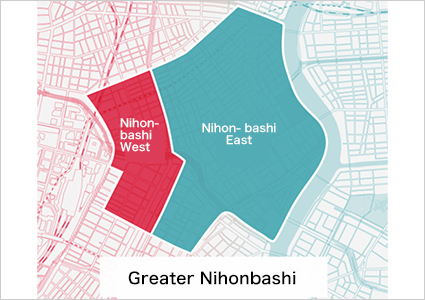
The West Area and East Area are divided by Showa Dori, and the area overall is Greater Nihonbashi. Mitsui Fudosan will conduct integrated neighborhood renaissance that draws on the differing personalities of these areas.
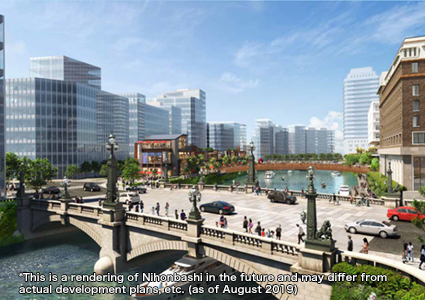
*View across Nihonbashi toward Hakozaki.
Nihonbashi Revitalization Plan Vision
The road to the future starts at Nihonbashi
Nihonbashi in the Edo period served as the starting point for five major roads, so it was a gathering place for people and goods from all over Japan. This made it a highly innovative district and through this interaction and exchange it gave rise to new industries and cultures. Mitsui Fudosan wants to reestablish in contemporary times the centrality Nihonbashi once enjoyed and with the world as its stage. It is aiming to make the district a place where people from all over the world gather and interact, as well as be a starting point for broadcasting new, forward-looking values globally.
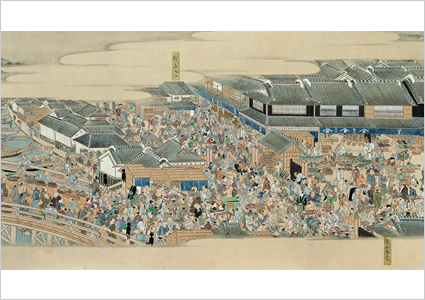
Kidaishouran (Part), Asian Art Museum
Photo AMF / DNPartcom / © bpk / Museum für Asiatische Kunst, SMB / Jürgen Liepe

*Looking across Nihonbashi toward Hakozaki.
3rd Stage of the Nihonbashi Revitalization Plan
| Three Priority Initiatives |
|
|---|---|
| Approach to Neighborhood Renaissance |
Understand, collaborate, communicate |
In the 3rd Stage, based on an “understand, collaborate, communicate” approach to neighborhood renaissance, Mitsui Fudosan will promote development of the district to realize the vision of the Nihonbashi Revitalization Plan.
| Slogan |
JAPAN COLLABORATION NIHONBASHI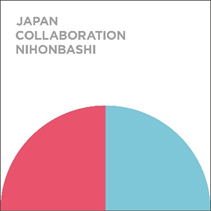
|
|---|
The slogan is for embodying the “understand, collaborate, communicate” approach to neighborhood renaissance in the 3rd Stage of the Nihonbashi Revitalization Plan.
The company will take an open approach to the district’s neighborhood renaissance and invite interested partners to conduct various collaborations that draw on Nihonbashi’s ample local resources.
Original value will be created in Nihonbashi and broadcast to the world.
Development concept: “Preserving and Revitalizing the Heritage while Creating the Future“
Initiative policies: Creating business clusters, neighborhood renaissance, in harmony with the community and reviving the aquapolis
About the Three Priority Initiatives
(1) River and Waterside Regeneration
Five redevelopment projects* are planned for the Nihonbashi riverside that will have a total site area of approx. 6.7 hectares (approx. 20,000 tsubo) and total facility floor space of 370,000 tsubo. When the projects are complete and the Shuto Expressway is moved underground, there will be a large, park-like water area that is approx. 100 meters wide, including the river, and 1,200 meters long.
The riverside will see sophisticated mixed-use development that includes retail for urban vitality and plazas, offices and hotel accommodations. The water area will feature artwork and rest spaces, and plans also call for utilizing the space to hold locally themed festivals and conferences.
*Redevelopment projects are currently in the planning stage. The overall scale, etc. may change.
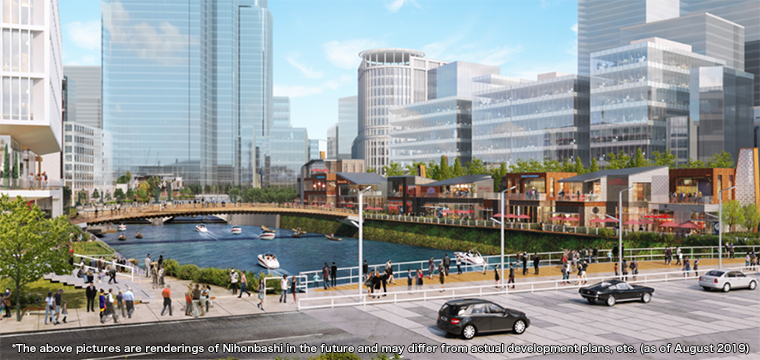
Looking at the Muromachi 1-chome water area from Edobashi.
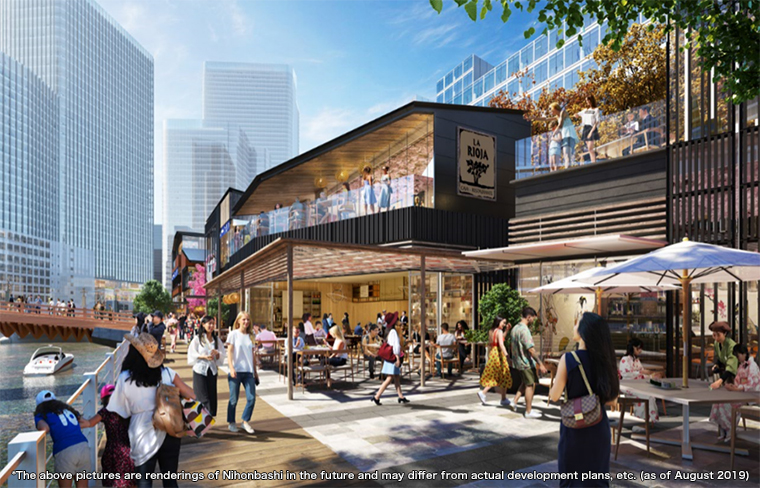
A vibrant Nihonbashi waterfront
Realized through River and Waterside Regeneration
The water area and pedestrian network that will be created through the Nihonbashi riverside redevelopment project will integrate the Tokyo Station area with the Nihonbashi area. In addition, a waterway transport network with Nihonbashi as a hub will connect multiple points on the waterfront. Nihonbashi, as an aqua metropolis, with interlaced urban walkway and waterway transport networks, is set to become the main artery of Tokyo.
Walkway network connecting Nihonbashi and Tokyo Station
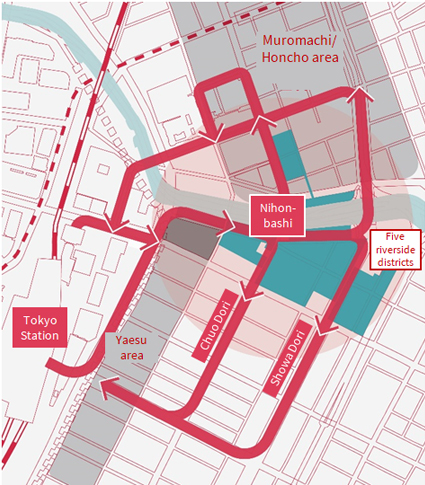
The park-like water area, which will be approx. 1,200 meters long and 100 meters wide when including the river width, will seamlessly connect the Nihonbashi area with the Tokyo Station area. It will also connect in with alleyways brimming with local personality to make the Tokyo Station area fun and enjoyable for walking.
Waterway transport network connecting the waterfront with downtown
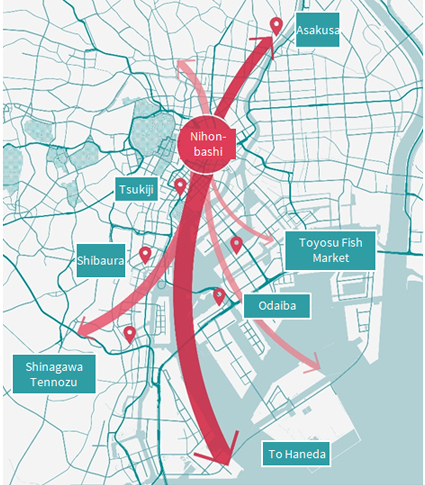
Nihonbashi as a downtown waterway hub close to Tokyo Station
The waterway transport network will connect various points along the waterfront like Haneda, Odaiba, Shibaura, Harumi, Toyosu and Asakusa and provide a new transportation option for tourism and everyday living.
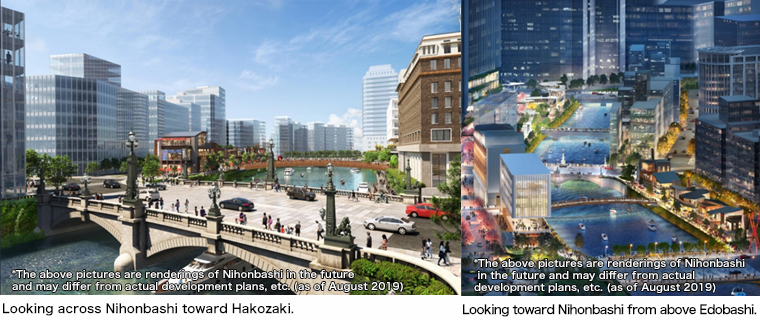
(2) A Focus on Tomorrow’s Innovative Industries
The focus will be on new strategic areas like aerospace, mobility and food, in addition to life science, to promote industry-creation distinctive to Nihonbashi. Efforts will be made to develop sites and create opportunities that will generate Nihonbashi-original business and culture and encourage co-creation, and support will be provided for industry growth in terms of both infrastructure and systems.
Continuing strategy category: Life science
Edo-period Nihonbashi was home to many medicine wholesalers and is now being transformed into a hub for life science companies.
Through LINK-J, efforts are being made to create sites and opportunities and promote open innovation to attract major industry players.
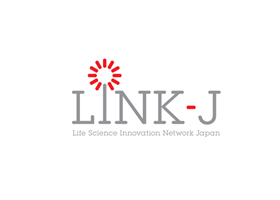
[Establishment of LINK-J]
LINK-J has been established to create opportunities for government-industry-academia partnerships and to help train entrepreneurs and generate opportunities for investment in intellectual property.
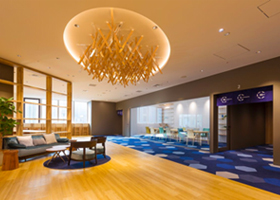
[Creating Places]
There will be a wide variety of sites established, including lease offices specifically for life science firms, service offices, conferences and shared laboratory space.
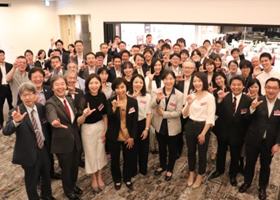
[Creating Opportunities]
Opportunities will be created for diverse interaction and exchange, including conferences and pitch events as well as networking events and receptions.
New strategic category: Aerospace, mobility, and food
| [Aerospace] | The aerospace industry is growing rapidly as private-sector companies have entered the market and the industry is also expected to help solve problems on the ground. The aim is to create new value pivoting on government-industry-academia partnerships. |
|---|---|
| [Mobility] | Given its history as an important point in overland and over-water transit, its mixed-used work-live-play functionality, and its waterway transport network, Nihonbashi is the perfect place to seek new forms of mobility and urban development. The principal aim is to provide new urban services. |
| [Food] | Nihonbashi was once home to a riverside fish market that spurred the flowering of Edo’s rich culinary culture. The challenge will be to establish new sites of innovation with the involvement of government, industry and academia and to carry on the district’s food culture and innovate by promoting collaborations with established proprietors. |

(3) A Vital and Welcoming International Stage
Nihonbashi is highly convenient whether coming from inside Japan or from overseas. Halls and conference space owned by Mitsui Fudosan, public spaces and other venues will be organically connected and the district itself transformed into event space. Large-scale events with a global reach that fuse business and entertainment are also being considered.
Further, efforts will be made to create appealing events and projects that combine tradition and innovation while leveraging the strong relationships shared with long-established companies and shops and with various creative professionals that Mitsui Fudosan has formed through its years of neighborhood renaissance.
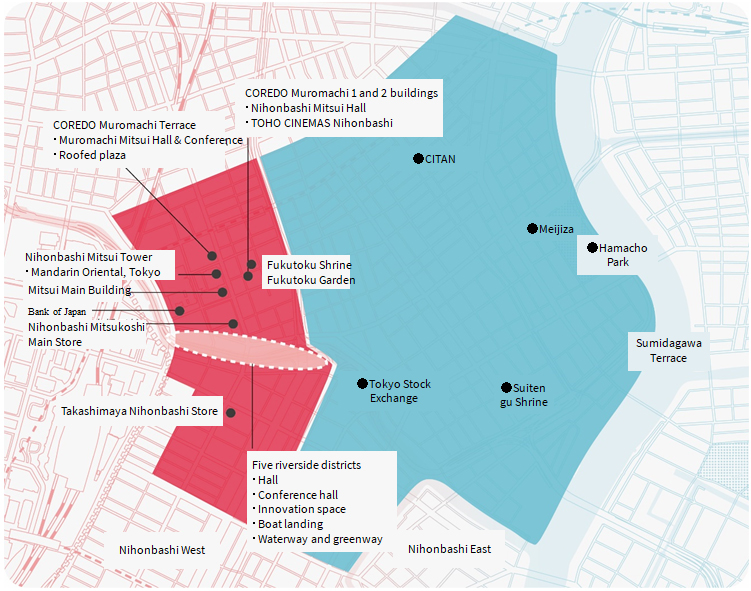
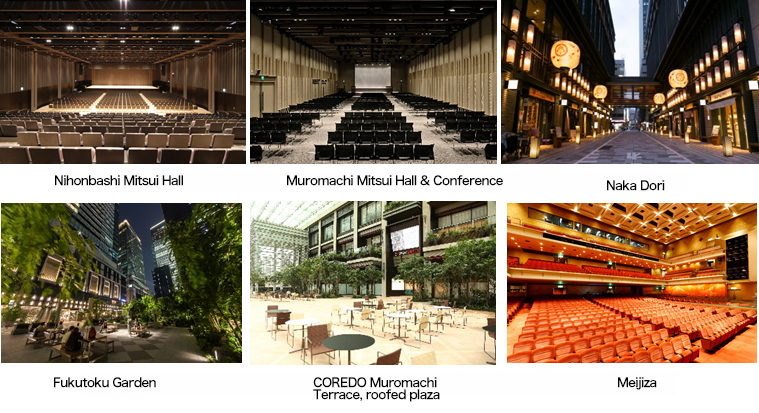
*The Nihonbashi Revitalization Plan is contributing to eight of the UN’s Sustainable Development Goals.
| Goal 3 | Good Health and Well-Being |
|---|---|
| Goal 7 | Affordable and Clean Energy |
| Goal 8 | Decent Work and Economic Growth |
| Goal 9 | Industry, Innovation, and Infrastructure |
| Goal 11 | Sustainable Cities and Communities |
| Goal 14 | Life Below Water |
| Goal 15 | Life On Land |
| Goal 17 | Partnerships for the Goals |
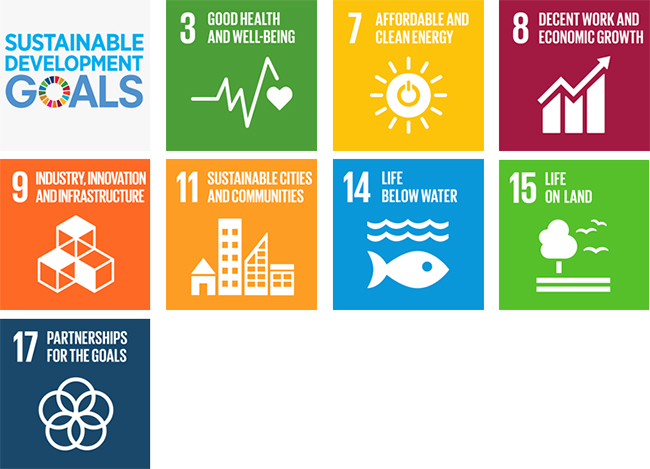
[For Reference]
Review of the Nihonbashi Revitalization Plan to its 2nd Stage (PDF:3.33MB)


























